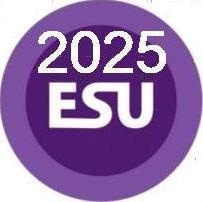What will happen during these two weeks?
Programme
The ESU DH 2025 in Besançon will be composed of workshops, teaser sessions, presentations of posters, projects and workshops results, conferences as well as cultural events. Please find here the updated programme.
Venues
The ESU DH 2025 will take place at the UFR SLHS in the heart of Besançon, at the 32, rue Mégevand, except Saturday 26 July when we will be in the nearby Espace Grammont located 20, rue Mégevand. Rooms will be indicated at the beginning of the ESU.
For you to feel some of the atmosphere of Besançon, the various culinary and cultural events will take place throughout the city.
Where are the participants from?
The 2025 edition gathered people from all over the world. The following map shows where the participants are coming from, have a look!
Conferences
Bridging Digital Humanities and Cultural Heritage: Key Insights from CLARIN, ATRIUM, and ECHOES
Tuesday 22 July, 4.30 - 6.30 pm
This session provides an overview of three key initiatives relevant to the digital humanities and cultural heritage fields. First, we will introduce CLARIN, a European Research Infrastructure for Language as Social and Cultural Data, and demonstrate how to locate and search for essential language resources and tools for research in digital humanities and cultural heritage. Next, we will present ATRIUM, offering insights gleaned from a recent survey of researchers in the Arts, Humanities, and Social Sciences. This segment will highlight the various tools used in research activities and identify prevalent skills gaps and training needs within the community. Finally, we will explore ECHOES, which focuses on the Cloud for Cultural Heritage. We will share findings from the ECHOES Consultation, aimed at mapping the diverse cultural heritage communities and understanding their unique needs and expectations. Join us for an engaging discussion that bridges language technology, research practices, and cultural heritage insights.
Speakers
Iulianna van der Lek, CLARIN ERIC Training and Education Officer
Maria Ilvanidou, Athena Research Centre / also member of the DARIAH network
Rémi Petitcol, Head of Research Infrastructures, Fondation des Sciences du Patrimoine
An Andean Perspective on Digital Humanities
Thrusday 24 July 4.30 pm - 6.30 pm
Summarizing recent developments across the Andes, Magally Alegre-Henderson and Javier Vera present a vibrant academic scene, reflecting on experiences of Digital Humanities in Chile and Peru.
Linking Cultural Knowledge: Graphs, AI, and Interdisciplinary Encounters in the Digital Humanities
Dr. Javier Vera Zúñiga, independent scholar
In this talk, we explore how graph-based approaches are transforming research in the digital humanities. From modeling typological features in South American Indigenous languages to building knowledge graphs that connect historical archives and intangible heritage practices like Marian devotions in Paucartambo (Peru), graphs allow us to see patterns, ask new questions, and connect distant fields. By combining tools from statistical mechanics, AI, and information science, we’ll discuss how networks can be both rigorous and poetic—bridging computation with cultural meaning. Through concrete examples of linguistic, archival, and ritual data, this session will offer a panorama of how graphs can support collaborative, interdisciplinary, and socially grounded digital research.
From paper to cloud: Archival heritage in the verse of Digital Humanities
Prof. Magally Alegre-Henderson, Pontifical Catholic University of Peru
Starting at the production of nearly 150 thousand images in a digitization project funded by the Endangered Archives Programme, the Historical Archive Riva-Agüero, the most important private repository in Peru after the National Archives, has incorporated a Digital Humanities approach for increasing archival consultancy under the principles of FAIR: Findability, Accessibility, Interoperability, and Reusability. From digitization initiatives, to training in Handwritten Text Recognition, from text extraction, to visualization and data/text mining, Digital Humanities tools represent a transformative opportunity for accessing Peruvian documentary heritage.
Rewiring the Canon: Feminist and Social Justice Frameworks in Digital Humanities
Tuesday 29 July 4 pm - 6 pm
Susan Schreibman
Professor of Digital Arts and Culture, Maastricht University
Director, DARIAH
Digital Humanities (DH) tends to be described in terms of technologies and methodologies. Digital Humanists are often typified as intermediaries between computer scientists and those who are less technologically inclined. But the Digital Humanities are far less discussed as instruments for societal change and as a vehicle for public good. This talk will discuss two recent publications that take this critical and affirmative stance towards the creation, use, integration and influence of digital humanities (DH) practice and pedagogy through a feminist and/or social justice lens. The first publication is a #dariahTeach course called Social Justice in the Digital Humanities. This course is composed of a series of case studies divided into three larger themes. While Social Justice as a concept and practice takes various forms in different disciplines, many of the case studies in this course frame their research around restorative social justice: a value-based approach that foregrounds inclusion, democracy, responsibility, reparation, safety, healing, and reintegration. The second publication is an edited collection entitled Feminst DH (which has been published open access and can be downloaded here). The thread that runs through this collection is a theorisation of feminist DH practice as sites of possibility for exploring, exposing, and revaluing marginalized forms of knowledge production through new modes and processes of meaning making. Each chapter also reflects on what it means to be a feminist and a technologist. Both publicaitons are freely available online. Students are encouraged to browse these publications in advance of the lecture.
Conference from Øyvind Eide (University of Cologne / European Association for Digital Humanities )
Thursday 31 July, 4 pm - 6pm
More details to come soon.
Transkribus workshop
Monday 28 July, 4 pm - 6 pm
Sara Mansutti (University of Cork / ReadCoop)
Two hours of talks and Q&As on the various possible uses of Transkribus.
